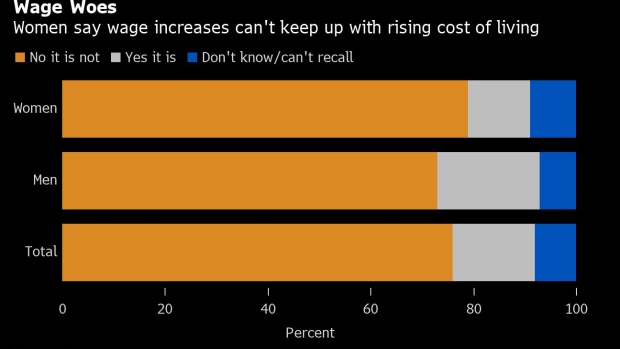Aug 16, 2022
UK Women Less Likely Than Men to Challenge Insufficient Wages
, Bloomberg News

(Bloomberg) -- Women in the UK are less likely to ask for wage increases than their male counterparts even though more female workers are experiencing living costs rising faster than their salaries.
Only 12% of UK women said that pay rises in the last year were substantial enough to keep up with rising costs compared to 20% for men, according to research conducted by YouGov in July. The number of people got a raise was on par between genders, but 13% of men asked for higher salaries -- almost double the portion of women making the request.
The findings underscore a gender divide over pay that’s likely to widen as inflation rises. The Bank of England expects price growth to top 13% later this year, more than six times higher than its target.
“UK consumers are amongst the most likely to say that pay rises -- the majority of which were below 5% -- simply aren’t enough to keep pace with rising living costs,” said Emma McInnes, YouGov’s global head of financial services. “This is most keenly felt by older households and part-time workers, both of which are parts of society more vulnerable to escalating cost of living pressures.”
The central bank’s Governor Andrew Bailey said that UK workers should refrain from asking for excessive pay increases, warning that policy makers would have to raise interest rates to halt signs of a wage-price spiral.
YouGov’s research of almost 20,000 people worldwide found that British people are feeling a greater inability to cover rising costs with higher pay than many people in other nations. In the UK, 17% more people reported stagnating pay than the global average. European workers surveyed indicated they were more likely to ask for wage increases than in Britain.
“Globally, consumers are feeling the pinch and the general consensus is that pay rises -- if they have happened -- have not been sufficient to cover cost of living increases,” McInnes said. “This is most evident in European markets, which have seen energy prices driven up by the war in Ukraine in addition to wider global supply chain challenges.”
Rising prices around the world are weighing on workers everywhere, but it’s women in the UK who are particularly squeezed, the survey indicated.
Although British companies offered slightly more women pay increases they did for men, those raises tended to be at the lower end of the scale, with 2% increases for women the most likely outcome, according to YouGov. Twice as many men than women saw top pay rises of greater than 10%.
In the next year, only a fifth of women plan on asking for a greater pay raise. A quarter of men stated they will ask for a more substantial wages.
(Updates with comment from YouGov.)
©2022 Bloomberg L.P.


